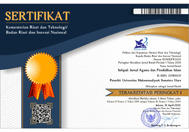Ibn Khaldun's Thoughts on Islamic Education (Instrumental Pragmatist) and Their Relevance to Contemporary Islamic Education
Abstract
The 21st century demands a quick and appropriate response from the Islamic education system as a whole, so that Islamic education in the future will need to continue to improve, both in terms of curriculum and Islamic educational institutions. The urgency and purpose of this study is to describe Ibn Khaldun's view of Islamic education and its relevance to contemporary Islamic education. This research used library research with primary sources in the form of Ibn Khaldun's book al-muqaddimah and secondary sources in the form of books and journals relevant to this research whose data were analysed through content analysis. The results of this study indicate that Ibn Khaldun's idea of Islamic education consists of educators and students, curriculum, materials and learning methods. And also Ibn Khaldun belongs to the pragmatic-instrumental stream of education in which this school has the first criterion, the teachings and values contained in the Al-Qur'an and Sunnah are still understood by not letting go and still taking into account the concrete situation of the dynamics of the association, the classical and contemporary eras that surround it. Secondly, Islamic education is always based on concepts that pay attention to practical benefits. Thirdly, philosophical thinking that is always general/universal in nature so that it can be applied in all places, circumstances and changing times. The relevance of Ibn Khaldun's thought to contemporary Islamic education is that Islamic education can adapt to the times and have practical value.
Keywords
Full Text:
PDFReferences
Al-Kitbi, M. F. (1972). المقدمة العلامة ابن خلدون. Al-Takadum.
Amin, P. M. (2011). Comparative Study of Social Change: Ibn Khaldun and Classical Sociologist. Insight Islamicus, 11, 126–144.
Anwar, S. (2008). Konsep Pendidikan Ibnu Khaldun (Refleksi Pemikiran Seorang Sosiolog Muslim Abad 14 M tentang Pendidikan). Ta’lim MKDU, 6(1), 1–10.
Asfar, M. I. T. (2019). Analisis Naratif, Analisis Konten, Dan Analisis Semiotik (Penelitian Kualitatif). January, 2.
Dale, S. F. (2006). Ibn Khaldun : Th E Last Greek And Th E First Annaliste Historian. International Journal of Middle East Studies, 38(3), 431–451.
Dkk, E. (2022). Metode Penelitian Kepustakaan (Library Research). CV. Media Sain Indonesia.
Enan, M. A. (2013). Biografi Ibnu Khaldun “Kehidupan dan Karya Bapak Sosiologi Dunia.” Zaman.
Garrison, D. H. (2012). Ibn Khaldun And The Modern Social Sciences: A Comparative Theoretical Inquiry Into Society, The State, And Revolution. University of Denver.
Gierer, A. (2001). Ibn Khaldun on Solidarity (“Asabiyah”)-Modern Science on Cooperativeness and Empathy: a Comparison. Philosophia Naturalis, 38, 91–104.
Gilbert, M. soyer & P. (2012). Debating the Origins of Sociology Ibn Khaldun as a Founding Father of Sociology The Nexus of Group Dynamics and Personality in FPSG View project. International Journal of Sociological Research, 5(1–2), 13–30.
Hernawan, W. (2015). Ibn Khaldun Thought : A review of al-Muqaddimah Book. 92(2), 173–184.
Hidayat, S., & Wakhidah, A. N. (2015). Konsep Pendidikan Islam Ibnu Khaldun Relevansinya. Profetika (Jurnal Studi Islam), 16(01), 93–102.
Khaldun, A.-A. A. bin M. bin. (2001). Terjemahan Mukaddimah Ibnu Khaldun. Pustaka Al-Kautsar.
Mahrus, S. K. & E. (2013). Jejak Pemikiran Tokoh Pendidikan Islam. Ar-Ruzz Media.
Marzuki. (2015). Pendidikan Karakter Islam. AMZAH.
Nasikin, M., & Khojir. (2021). Rekonstruksi Pendidikan Islam di Era Society 5.0. Cross-Border, 4(2), 706–722.
Nata, A. (2019). Pembaharuan Pendidikan Islam Di Indonesia. Prenadamedia Group.
Pasiska. (2019). Epistemologi Metode Pendidikan Islam Ibnu Khaldun. El-Ghirah, XVII(02), 129–149.
Ramli, M. (2015). Hakikat pendidikan dan peserta didik. Tarbiyah Islamiyah, 5(1), 61–85. https://jurnal.uin-antasari.ac.id/index.php/tiftk/article/view/1825
Rida, M. J. (1980). Al-Fikr Al-Tarbawi Al-Islami; Muqaddimah Fi Ushulihi Al-Ijtima’iyyah Wa Al-‘Aqlaniyyah. Dar al-Fikr al-Arabi.
Rosyida, A. (2020). Relevansi Penerapan Konsep Pendidikan Islam Menggunakan Filosofi Ibnu Khaldun Dalam Menghadapi Revolusi Industri 4.0. Muẚṣarah: Jurnal Kajian Islam Kontemporer, 2(2), 82. 6
Saepudin, J. (2015). Learning Model In The Perspective Of Ibn Khaldun: Reception To Muqaddimah Book. Jurnal Penelitian Pendidikan Agama Dan Keagamaan, 13(2), 222–238.
Siregar, M. (2021). Filsafat Pendidikan Islam menuju Pembentukan Karakter. Pascasarjana FTIK UIN Sunan Kalijaga.
Siswanto. (2013). Dinamika Pendidikan Islam (Perspektif Historis). Pena Salsabila.
Siswatini, W. (2008). Konsep Pendidikan Islam Menurut Ibnu Khaldun Dalam Prolegomena (Analisis Epistemologi dan Metode Pembelajaran). Universitas Islam Negeri Malang.
Suharto, T. (2014). Filsafat Pendidikan Islam (Menguatkan Epistemologi Islam Dalam Pendidikan). Ar-Ruzz Media.
Suharto, T. (2020). Historiografi Ibnu Khaldun: Analisis Atas Tiga Karya Sejarah Pendidikan Islam. KENCANA.
THOHA, A. (1986). Muqaddimah An Intruduction To The History Of The World (1332-1406 M) (Pertama). Pustaka Firdaus.
Ulya, V. F. (2018). Pendidikan Islam di Indonesia: Problem Masa Kini dan Perspektif Masa Depan. Al-Hikmah Jurnal Studi Keislaman, 8(2), 137–150. 687.pdf
Unsi, B. T. (2018). Konsep Metode Pembelajaran Ibn Khaldun Dalam Pengajaran Bahasa Arab. Muróbbî: Jurnal Ilmu Pendidikan, 2(1), 60–71.
DOI: https://doi.org/10.30596/14434
Refbacks
- There are currently no refbacks.
Intiqad Jurnal Agama dan Pendidikan Islam is abstracting & indexing in the following databases:
View My StatsEditorial Address:
Faculty of Islamic Religion, Universitas Muhammadiyah Sumatera Utara. Jl. Mukhtar Basri No. 3 Medan 20238 Telp. (061) 6622400 ext. 27 dan 28 Fax. (061) 6625474. e-mail: intiqad@umsu.ac.id

_(1).png)
























